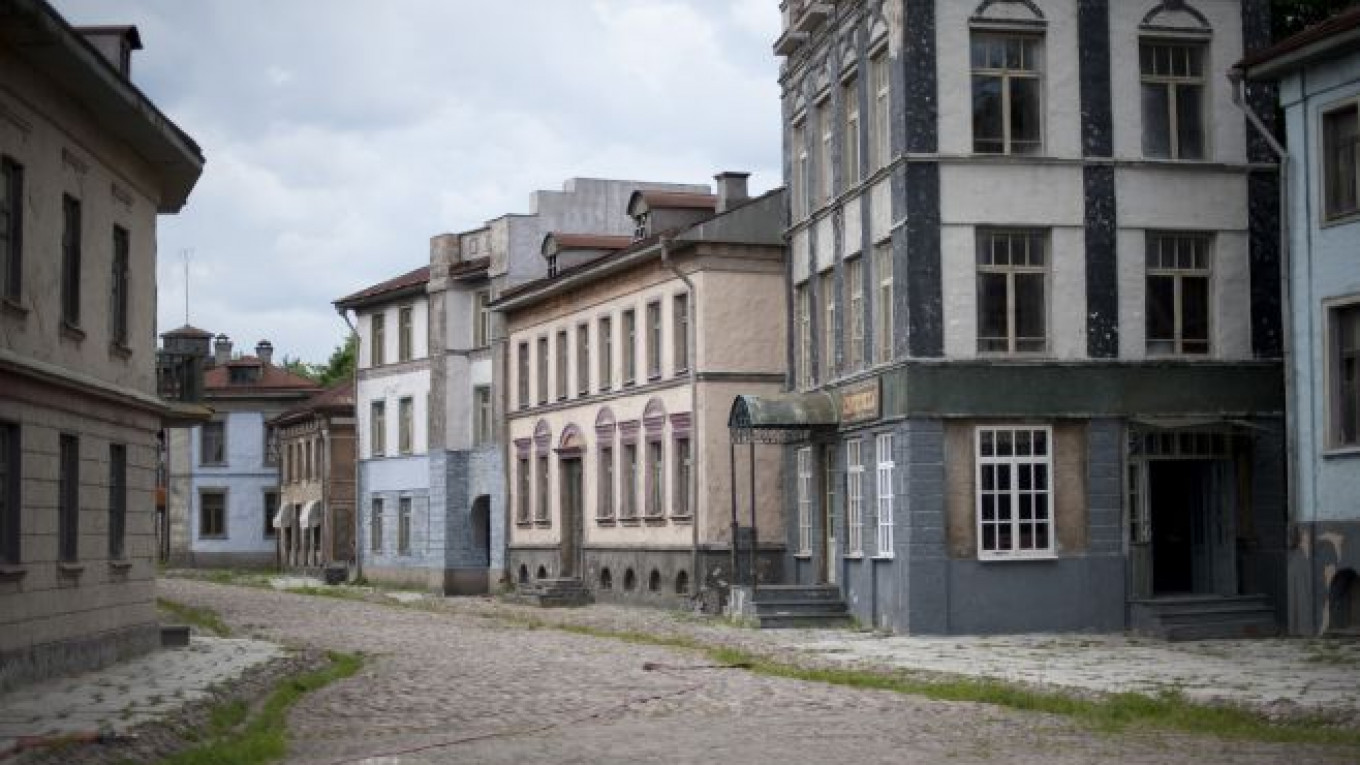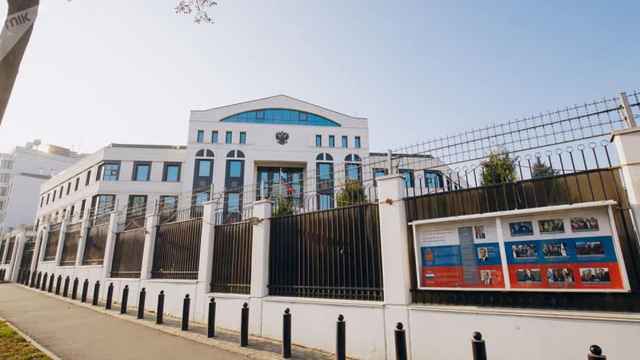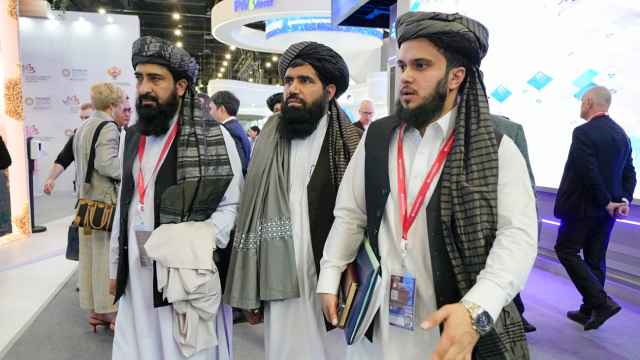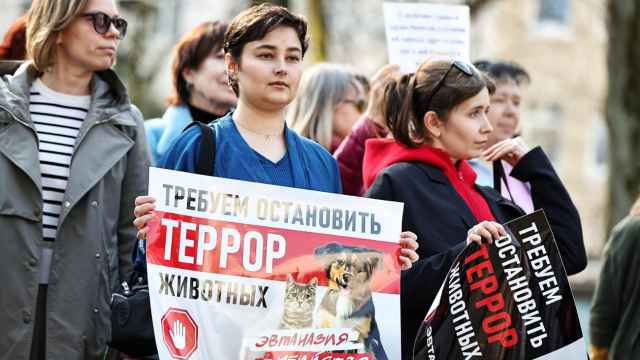Russia's largest film studio, Mosfilm, has secured a major investment aimed at bringing back its glory days after near collapse in the 1990s.
Amid a drive to boost Russia's cultural output and push back against the Hollywood films that dominate the country's box office, the government said earlier this month it had approved a private-sector investment in Mosfilm that will see the construction on its territory of two studio facilities, a costume storehouse, a cinema, a concert hall and a residential and office complex, costing at least $500 million in total.
See the photo gallery: A Tour of Russia's Legendary Mosfilm Movie Studio
The investor is Altera Park, an obscure construction company established last year and owned from Cyprus, according to news agency Interfax.
Mosfilm, which occupies a chunk of western Moscow just north of Moscow State University, is famous for producing such Soviet classics as "Moscow Doesn't Believe in Tears" and "The Cranes Are Flying." But though it says it remains one of the biggest film companies in Europe, its output has slowed to a trickle following the collapse of communism.
The studio's production of its own movies fell from 80 films a year in Soviet times to one or two films a year now, Mosfilm's first deputy director, Vladimir Ryasov, told The Moscow Times in an interview.
Mosfilm now operates mostly not as a producer of films, but as a technical base that provides services to other companies.
Optimists hope the investment can revitalize the studio, boosting not only the quality and quantity of films produced by Mosfilm but the entire Russian film industry, which is suffering from a lack of financing and poorly developed distribution system that makes it difficult for Russian films to get a wide release.
"Mosfilm is the flagship of the Russian film industry. The investment will affect the whole sector, which is now in a rather difficult situation," said Georgy Shabanov, the head of All Media Company, a distribution and production company.
But others worry that the cash will be spent in vain. The value of the film production company no longer lies in its physical scale, but in the people and ideas it generates, said Oleg Berezin, head of St. Petersburg film studio Nevafilm.
A massive building project is unlikely to help, he said: "The money should be invested primarily in education, not in the construction of new studios."
But Mosfilm's Ryasov said the investment project was a very important step toward the development of the studio.
"This will help to expand the possibilities of a studio that for a long time existed using only its Soviet inheritance," he said.
90-Year History
Mosfilm dates back to 1924 and the merger of two film studios. Construction of the giant film complex where well-known directors such as Sergei Eisenstein, Alexander Dovzhenko and Andrei Tarkovsky created their masterpieces began three years later.
Like all Soviet studios, Mosfilm was funded by the state, but the flow of cash stopped abruptly with the collapse of communism in 1991. Suddenly deprived of revenue and with the country in economic crisis, Mosfilm suffered a great outflow of specialists into other industries where they could earn a better paycheck.
"There was a period in the 1990s when Mosfilm produced no movies at all," Ryasov said.
In the late 1990s, private Russian film production companies started to appear and develop quickly. Mosfilm's equipment, already outdated, began to fall further behind.
When Russian filmmaker Karen Shakhnazarov became head of the studio in 1998, he made modernization his priority and began to rebuild. Using revenues from film production services and renting its collection of classic films, Mosfilm re-equipped.
Over the past nine years the studio says it has increased its profits by 10 times, though it provided no revenue or profit figures.
Mosfilm is now as technically well-equipped as the world's major players, Ryasov said, giving it an advantage over smaller Russian rivals.
Helping the Industry
Shakhnazarov also pushed for new infrastructure construction on the territory of Mosfilm, asking President Vladimir Putin two years ago to find an investor for the studio.
In return for development, Mosfilm offered its land.
The studio occupies a huge territory of about 34 hectares, on which Altera Park will be allowed to build an office and residential complex with an area of 93,600 square meters, according to the government statement.
The studio urgently needed new facilities, according to Ryasov. Not a single thing had been built on its premises since 1960, he said.
One of the new constructions to be erected at Mosfilm is a movie theater, which is intended to be a platform for showing films by Russian directors struggling to get their works released by local distribution chains, Ryasov said.
This will be our contribution to the Russian film industry, he added.
Contact the author at bizreporter@imedia.ru
A Message from The Moscow Times:
Dear readers,
We are facing unprecedented challenges. Russia's Prosecutor General's Office has designated The Moscow Times as an "undesirable" organization, criminalizing our work and putting our staff at risk of prosecution. This follows our earlier unjust labeling as a "foreign agent."
These actions are direct attempts to silence independent journalism in Russia. The authorities claim our work "discredits the decisions of the Russian leadership." We see things differently: we strive to provide accurate, unbiased reporting on Russia.
We, the journalists of The Moscow Times, refuse to be silenced. But to continue our work, we need your help.
Your support, no matter how small, makes a world of difference. If you can, please support us monthly starting from just $2. It's quick to set up, and every contribution makes a significant impact.
By supporting The Moscow Times, you're defending open, independent journalism in the face of repression. Thank you for standing with us.
Remind me later.






